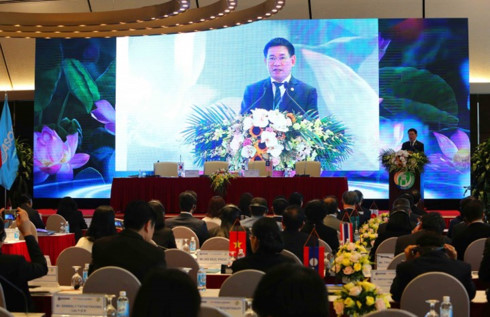ASOSAI 14: Strengthening commitment to high-level public audit standards
 |
At the meeting, Madinah Binti Mohamad said, Supreme Audit Institutions (SAIs) of member countries pin all high hopes on ASOSAI 14, especially on the implementation of the 2016-2021 ASOSAI strategic plan. Therefore, along with programs for capacity building and cooperation with ASOSAI, the Governing Board will spare no efforts to come up with a strategy to deal with public audit-related issues with higher quality.
The ASOSAI 13 Chair highlighted ASOSAI as an opportunity for the Governing Board to better understand the challenges and difficulties faced by SAI members.
One of the challenges facing public auditors today is how to achieve a high level of accountability, prevention, and settlement of thorny problems while ensuring the confidence of the public and society, from which they will cooperate with SAIs in providing information about wastage, frauds or wrongdoings. This will help to pinpoint causes and propose measures to solve existing difficulties, said Madinah Binti Mohamad.
The Malaysian Auditor General stated that the responsibility of public auditors for public opinion is more important than ever, requiring SAI members to step up cooperation and commitment on public audit standards to the highest level to serve the common interests of members.
General Auditor of Vietnam Ho Duc Phoc assured the State Audit of Vietnam (SAV)’s desire to continue working closely with SAI members across diverse fields in the years to come in order to strengthen capacity building and knowledge sharing to deal with current challenges which is adversely affecting transparency, accountability and good governance.
"With all of our great efforts, I strongly believe that ASOSAI will grow and flourish to a new height," he emphasized.
At the meeting, SAV Deputy Auditor General Doan Xuan Tien presented the Hanoi Declaration- an important official document of the 14th Assembly of ASOSAI- which aims to convey the most important message of the 14th ASOSAI and the seventh symposium themed “Environmental Auditing for Sustainable Development”, which reflects ASOSAI's ideas and proposals for public audit to the regional and global communities.
The Hanoi Declaration summarizes the most important working results of the event and reflects the commitment and action of the ASOSAI community for the organisation’s development objectives for the 2016-2021 period, focusing on the sharing of knowledge among its supreme audit institutions.
It also affirms the interest, efforts, and practical contributions of the ASOSAI community to pursuing sustainable development goals for the world in general and dealing with global environmental challenges in particular.
The Hanoi Declaration reaffirms the desire to achieve economic growth in harmony with sustainable development through a score of measures: increasing knowledge and experience sharing, disseminating standards and instruction documents on environmental audit of SAI members, organizing training courses on environmental audit, encouraging the implementation of joint national audits in accordance with mandates of SAIs, and pledging to develop mechanisms and processes to support these activities.
The Hanoi Declaration underlines that over the 40 years of development since the ASOSAI Charter was set out, ASOSAI established itself as a leading multilateral cooperation organization in Asia, however, the difference between SAI members have long since existed and are still one of the issues that need to be resolved. Asian state auditors of SAIs from 46 countries will continue to carry out ASOSAI's mission to promote knowledge sharing and capacity development of SAI members with a particular focus on developing environmental audit for the sustainable development of regional nations.
Additionally, member states are encouraged to build legal regulations and documents on environmental management, thereby creating a legal corridor for SAIs to play a role in monitoring the implementation of these regulations as well as making regional reports on environmental audit.

